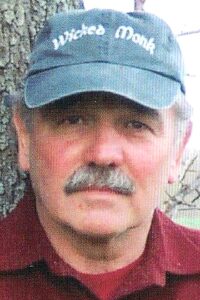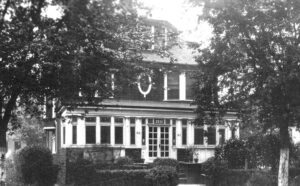LETTER from TERRY BERKSON
Chickie’s Greatest Gift

When I was 8 years old, the hero in my life was my cousin Chickie, who drove an oil truck and often took me with him on deliveries.
The job led him all over Brooklyn and, being somewhat of a scavenger, he often came home with a bike or a wagon or some other discarded contraption he thought would be useful.
We lived in Bensonhurst, in a 12-room Victorian that had been divided into apartments. I occupied the second floor with my dad, while Chickie and his wife and two babies lived on the first floor and my Aunt Edna and Uncle Dave and their sons Leo and Charlie lived on the attic floor.
There was also Mr. Bilideau, the boarder, who was a leftover from the time when my grandmother had rented rooms. There had once been a Mr. Yumtov as well, a man who liked to store smoked whitefish in his dresser. Mr. Bilideau was from Canada. He had a room on the second floor and shared the bath with my father and me.
Just about everyone in the house owned something that Chickie had brought home and thrown on the front porch. “I thought you could use one of these,” he’d always say.
In spite of the partitions, it was difficult for so many people to be housed under one roof without having feuds over hot water and noise and things disappearing from refrigerators. Half the time somebody upstairs wasn’t talking to somebody downstairs. Chickie, with his various street finds, was often instrumental in getting them back on speaking terms.
One year, about a week before Thanksgiving, arguments were running high when Chickie came home with a live turkey in a crate. “It’s a 27-pounder,” he announced to several of us who had gathered on the front porch.
I had never seen a turkey alive and up close like this. “Where’d you get it?” I asked, cautiously poking a finger through the bars. “Did it fall off a truck?”“Never mind,” he said. “There’s enough here for all of us.”
I was placed in charge of watering and feeding the bird, which to me looked like some kind of prehistoric monster. I had to lower the water pan through an opened hatch in the top of the cage.
“Don’t worry,” Chickie reassured me when he saw the concern on my face. “That big bird’ll never get through that little hole.”
I figured they must have put the turkey in the crate when he was small and kept feeding him.
So any hard feelings were put aside and preparations for a Thanksgiving dinner at one table were divided between Aunt Edna and Chickie’s wife Ann.
Aunt Edna would bake the pies – mince, blueberry and apple – while Ann would roast the turkey, make stuffing and gravy and prepare candied sweet potatoes, plum pudding and the rest.
Dad, who was working nights on his taxi, would supply the wine and cider and Mr. Bilideau would buy some fruit – and chestnuts, I hoped.
Meanwhile, Chickie had taken to calling the turkey Sylvester, and would spend time with it out on the porch when he came home from work.
He’d stick a fat calloused index finger through the bars and let the bird peck at it. “You’re gonna be a good turkey,” he’d say affectionately.
I was still afraid of the thing and hadn’t warmed up to it that much, but all the talk about how this bird was going to taste sent uneasy twinges through my wishbone.
Three days before Thanksgiving, Chickie came home with bad news. The butcher around the corner didn’t want to slaughter Sylvester. He tried other butchers and they refused too. It suddenly looked like we weren’t going to have turkey for dinner.

We were all gathered in the kitchen trying to come up with a solution. Chickie had carried the crate into the house and put it on top of the stove. “I hear you just chop off his head,” he was musing.
Uncle Dave mentioned that Mr. Bilideau had grown up on a farm in Canada: Surely he’d know how to butcher the bird. “But what about cleaning it and plucking the feathers?” Aunt Edna protested. “That’s a real mess!”
All this talk about butchering must have been too much for Sylvester, too, because suddenly, impossibly, he was out of his crate, flapping his tremendous wings and scratching at anything in sight with his clawed feet.
Everyone scrambled out of the kitchen. Leo and I ran for the bathroom while the others headed for the hall. The last thing I saw was Chickie struggling to keep Sylvester from becoming airborne. I worried that the bird would take my cousin’s eyes out.
How was he going to squeeze Sylvester back through that small trapdoor? I could hear both of them swearing.
After what seemed like a very long time, Chickie announced that the coast was clear. We all crept into the kitchen and found that Sylvester was back in his box. He didn’t look much worse for wear.
“I was careful not to hurt him,” Chickie said.
Mr. Bilideau came downstairs and entered the kitchen to find out what all the commotion was about. When asked he said, “Yes, I’ll butcher the turkey if you have a sharp hatchet.”
He explained that the way to get the feathers out easily was to scald the freshly killed bird in a vat of boiling water. He would use the tree stump in the back yard for the first part of the operation and a lobster pot from the cellar for the second. The procedure would take place the next day after work. We were going to have turkey after all. Chickie stood there in the kitchen with his hand on the hatch door as Sylvester tried to bite through the bars.
The next morning when I left for school the bird wasn’t on the porch. He wasn’t in the cellar or out in the garage, either. Chickie’s Nash was gone from the parking place next to the house. Maybe he had come up with a brainstorm on how to get Sylvester butchered and avoid all the mess.
I was glad that Mr. Bilideau had been relieved of the job. With him doing it, I pictured us all sitting around chewing on feathers.
After school I ran home and eagerly waited for Chickie to return with Sylvester. I felt a little guilty about it, but I was kind of looking forward to seeing the bird stripped of his claws and feathers and head. I sat on the stoop as big wet snowflakes floated toward the ground.
Chickie pulled in the driveway right on schedule. He got out of the car with a large brown paper bag and walked up to where I was sitting.
“Is that the turkey?” I asked.
“Yeah,” he said. I looked in the bag. There was a bald thing with pockmarks all over it.
That Thanksgiving was one of the most festive I can remember. The table was so long we had to set it up in the hall. I noticed that Chickie, sitting at the head, was in especially good spirits.
In my mind, the feast with a golden-brown bird at the center seemed to exude a joyous radiance. Somehow I understood that it was our turkey, Sylvester, that had brought us all together.
Years later, on a cold November day, as we were on our way to make an oil delivery, I asked Chickie if it had really been Sylvester in the bag that afternoon. He chuckled as he shifted the Mack down to a lower gear.
Then he looked over at me and said, “Nah.”

